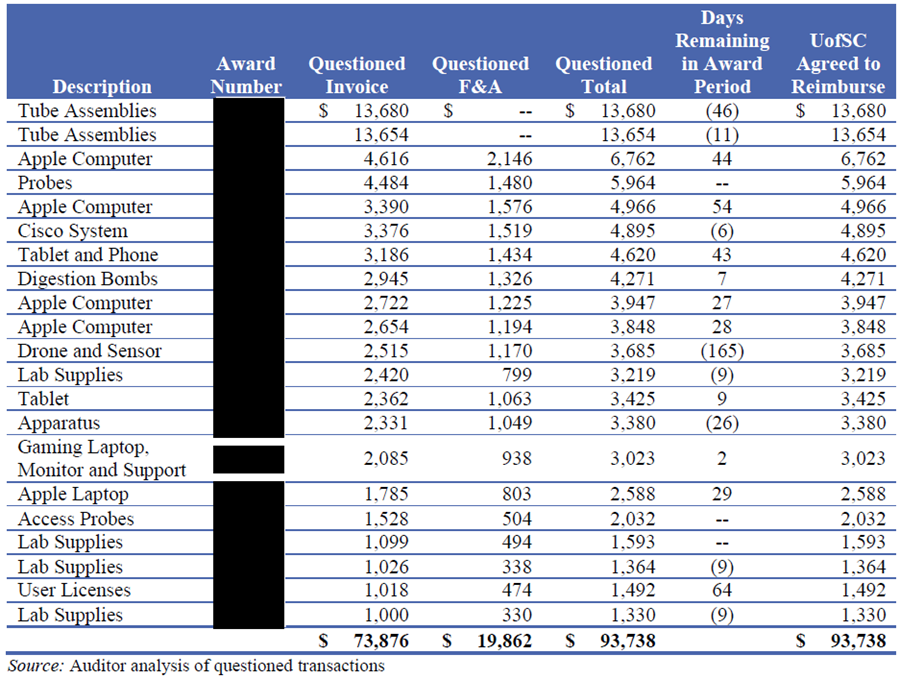OGC News - July 2022
Financial Services Connection
Jul 5, 2022
OGC CONTRACTS
Monitoring Responsibilities and Requirements for Federal Subawards
Monitoring Requirements
PIs and their administrative units must ensure continuous and ongoing monitoring of the financial and programmatic performance of each federal subaward, per 2 CFR 200.332(d) and University policy. As a steward of federal funds, PIs and administrative units must have reasonable assurance each subrecipient complies with the terms and conditions of the subaward and is making adequate progress towards the subrecipient’s project goals and outcomes.
Auditors and federal agencies regularly request monitoring records to assess the University’s compliance with federal requirements. Failure to maintain a monitoring record may result in cost disallowances associated with our subaward. Per University policy, “any penalties, disallowance, or losses of funding caused by non-compliance…will be the responsibility of the administrative unit in violation of the policy.”
To meet these responsibilities, PIs and their administrative units must:
- Maintain regular contact with the subrecipient to gauge project progress;
- Ensure all deliverables, including subrecipient progress reports, are timely and satisfactory;
- Verify the subrecipient adheres to the terms and conditions of the subaward;
- Address subrecipient non-compliance by communicating with OGC if changes to the statement of work, reporting requirements, or rebudgeting are needed
- Verify subrecipient invoices are timely, complete, and accurate;
- Ensure all subrecipient costs conform to the terms and conditions of the subaward and approved budget;
- Confirm that costs are aligned with technical progress.
Documenting Monitoring Activities
Monitoring activities MUST be adequately documented. The University provides a Monitoring Record Template and Monitoring Invoice Checklist that may be used or modified as needed.
Risk Assessment
OGC conducts a risk assessment on each federal subrecipient before a subaward is executed. If the risk assessment surpasses a certain risk score, our subcontracts team will discuss the assessment with you prior to providing an executed subcontract. If you would like a copy of the risk assessment for your subaward, please email ogc.subcontracts@ucdenver.edu.
Resources
OGC’s Subcontracts website provides additional subrecipient monitoring guidance and tools.
![]()
OGC PREAWARD
Launching the CU ORCID
We are writing to let you know about one of the first RIO initiatives, the ORCID campaign. ORCID stands for Open Researcher and Contributor ID, and is a global, not-for-profit organization that has the goal of uniquely identifying all who participate in research, scholarship, and innovation such that their contributions across disciplines, borders, and time can be documented. Funding agencies, including NIH, and publishers are increasingly requiring ORCIDs for submission.
Most people dislike having to maintain profile information in multiple places, such as your departmental website, your annual evaluation, etc. Why are these systems not connected? Why are they not more discoverable? The overarching goal of this ORCID campaign is to garner Anschutz community ORCID adoption and perform integrations such that the primary content required for grant and manuscript submissions can be used to maintain other local campus profiles, as well as to publicly promote individuals and campus research and expertise. The ORCID tool is very easy to use and can ingest content about you.
We plan to send communications via listserv, newsletters, and websites across CU Anschutz throughout this summer and in an ongoing cycle. We kindly ask for your help with these communications. Please mention the ORCID campaign to your faculty, staff and students and encourage them to sign up and use the wizard tool to populate their profiles.
The first step to use ORCID at Anschutz is to sign up for your InfoEd profile and share your ORCID ID at your InfoEd profile. When logged into your InfoEd profile, you will find an ORCID button that will redirect you to your ORCID login. After performing your ORCID login, your ORCID ID will be saved at your InfoEd profile. If you don’t yet have an ORCID account, you will be able to create one through the InfoEd ORCID integration.
We will be tracking campus use of ORCID and will provide updates to you on adoption in your unit as the project proceeds. You can track ORCID adoption across the Anschutz through the dashboards presented here. Beginning in November when we will have a greater critical mass, we will begin working on the integrations.
Please do reach out with any questions or ideas to either me or crio@cuanschutz.edu. We would be happy to discuss with your DFAs or other unit staff to help promote this ORCID campaign. Thank you for helping to ensure that the wonderful research and people on the CU Anschutz campus get recognized for their work.
Sincerely,
Melissa Haendel, on behalf of the RIO and CRIO council
eRA Commons Visual Change and RPPR Instructions Update
The Research Performance Progress Report (RPPR) Module in eRA Commons has moved to the new visual appearance being adopted by other eRA modules. This change is due to a required technology upgrade that enhances the security and stability of the module.
Commons new look and navigation:
The upgrade includes the addition of the new unique entity identifier (UEI) fields where applicable and required FORMS-G changes, including updated budget forms. Routing and navigation are now done by the three dots ... drop down menu used on many webpages and apps.
A final RPPR Instruction Guide was published on June 23, 2022, to reflect the revised screenshots accompanying the new look and feel of the RPPR module.
The new RPPR guide changes address:
- Updated directions for Editing Inclusion Enrollment Data (section 5.3.4)
- Added references to UEI throughout document
- Added section 5.2 Access RPPR from Closeout
- Added section 5.12 Final Progress Report Additional Materials (FRAM)
- Added section 5.13 Interim Report Additional Materials (IRAM)
- Updated instructions for SBIR/STTR RPPRs
- Updated text in 5.11 and 6.9
- Updated 6.8 Section H Budget form instructions
Forms-G and UEI Changes to Budget Forms for non-SNAP awards only. These are the changes to the SF424 Research and Related Budget Form in the RPPR:
- Under Other Direct Costs, increased the number of available ‘Other’ direct costs lines from 3 to 10.
- A UEI field that replaces the previous ‘Organizational DUNS’ field.
- Enhanced organization search — enter the organization name and the UEI, organization name and organization address will automatically populate the budget form.
Person Months Change
As a reminder in May, the NIH updated section D.1 addressing the need to include the PD/PI regardless of effort devoted to the project and each person who has worked at least one person month per year on the project during the reporting period, regardless of the source of compensation.
They also updated the logic on rounding. They now ask to use nearest one-tenth (i.e., one decimal place) of a person month that the individual worked on the project.

TRAINING & COMPLIANCE
Recent Federal Audit Summaries
The Office of Inspector General (OIG) for each federal agency has the authority to audit grant recipients. OIG audits are useful in understanding issues relating to federal grant management and to learn what issues auditors are examining for non-compliance. In the past year, the National Science Foundation (NSF) OIG has released numerous audits for universities which highlight various concerns related to research awards. While these audits are NSF-specific, the auditors’ findings are applicable to all federal awards.
Just as a reminder, under the University’s Roles and Responsibilities for Sponsored Project Administration policy, any fines, penalties, or disallowed costs associated with an award is the responsibility of the PI and their respective administrative unit.
The following is a list of some of the compliance issues identified in the recent audits.
Non-compliance with the Fly America Act
The Fly America Act generally requires the purchase of international airline tickets from US flag-carriers. When purchasing airlines tickets, PIs and administrative units should use Concur Travel to ensure compliance with the Fly America Act. Failure to comply can result in a cost disallowance for the entire ticket.
Recent audit findings include:
- The University of Texas – Dallas did not comply with the Fly America Act and auditors questioned $1,338 in travel costs.
- The University of California – San Francisco failed to comply with the Fly America Act and a auditors questioned $533 in airline charges and $319 for upgraded seat charges.
Failure to Acknowledge Federal Funding
Federal research awards generally require an acknowledgement of federal funding when a recipient issues press releases, publications, or other documents describing projects funded by the federal government. The National Institutes of Health (NIH) requirements are found in the annual Notice of Legislative Mandates (see item number 6) and NSF’s requirements are found in the Proposal & Award Policies & Procedures Guide (PAPPG). Failure to comply with this requirement can result in a cost disallowance for any costs associated with the publication.
Recent audit findings include:
- The University of California – Merced had more than $6,000 in publishing costs questioned because of the failure of multiple PIs to properly acknowledge NSF funding.
- The University of Idaho had more than $5,000 in publication costs of a research article questioned because the PI had identified three funding sources in the publication, but the University charged the entire cost to one award.
- The University of Texas – Dallas had $4,939 in travel costs questioned related to a PI presenting at a conference. The PI had acknowledged three funding sources in their presentation; however, the University charged 100% of the travel costs to just one award.
Inadequate Subrecipient Monitoring
Pass-through entities are required to ensure subrecipients are in compliance with award terms and conditions and 2 CFR 200.332 requires pass-through entities to adequately monitor subrecipients and document monitoring activities. PIs and administrative units may use the Subrecipient Monitoring Record to document monitoring activities. Failure to comply with requirements may result in the sponsor disallowing costs associated with the subaward, which requires the pass-through entity, not the subrecipient, to repay those costs.
One recent audit questioned more than $37,700 because the University of Wyoming failed to document monitoring activities of a subrecipient.
Equipment and Supply Purchases Near the End of the Award
Auditors and sponsors scrutinize equipment and large supply purchases near the end of an award to verify proper allocation of costs and to prevent award recipients from spending remaining funds on items not associated with the funded project. Auditors will examine the date of a purchase and compare the purchase date to the number of days remaining on the award to ensure the project benefits from the purchase. PIs and administrative units should verify any equipment or large supply purchases near the end of the award truly benefits the project and also allocate some of the costs to a department speedtype or other project. Failure to comply with this requirement can result in the disallowed costs for the equipment or supply purchases.
Nearly all of the recent NSF OIG audits included findings for equipment or supply purchases near the end of the award. For example, the University of California of South Carolina had more $93,700 in questioned costs. The table below is from the audit report and demonstrates that auditors closely review the number of days remaining on the award to determine if the costs are appropriate.

Non-Compliance With University Policies
When managing sponsored awards, recipients must comply with both the sponsor requirements and with institutional policies. When there is a conflict between the sponsor’s requirements and University policy, PIs and administrative units must adhere to the most restrictive policy. To ensure proper compliance, PIs and administrative units should carefully review all University policies governing sponsored projects along with the PSC’s Travel and Procurement policies. Failure to comply with University policies may result in disallowed costs, the termination of the award, or having a sponsor designate the University as a “high-risk” recipient, which results in additional administrative burden.
Recent audit findings include:
- The University of Idaho failed to comply with internal policies regarding time and effort certification and auditors questioned $2,100 of salaries charged to an award
- The University of Texas – Dallas had more than $30,000 in travel costs questioned because University PIs and personnel did not follow internal travel policies and procedures
- Tennessee State University failed to follow internal policies regarding effort certification and auditors questioned $121,797 in salary charges
- Clemson University failed to follow internal travel policies, equipment and procurement policies, subaward monitoring policies, effort reporting requirements, and budgeting practices. As a result, auditors questioned more than $45,000 in associated costs.
Participant Support Costs
Participant support costs are generally provided on training and fellowship awards and may only be used to support non-employees. Additionally, participant support costs cannot be rebudgeted without sponsor prior approval. Auditor frequently find universities misclassifying participant support costs, which can result in disallowed costs.
Recent audit findings include:
- The University of California – Merced had multiple findings related to unallowable participant support costs, which includes:
- $860 for expenses incurred to purchases t-shirts provided as gifts to participants which were not included in the approved budget nor appeared necessary for the project
- $94 in meal costs for University faculty and staff
- $394 for a PI mileage and meal costs to attend a NSF conference, which are unallowable because the University misclassified these costs as participant support costs
- The University of California – San Francisco had more than $18,000 questioned because the University misclassified participant support costs for employee-related travel.
Questions?
If you have questions regarding these compliance issues, you can reach out to your assigned OGC Post Award Administrator. The Compliance Office also offers sponsored training courses each semester and are also available upon request for individuals or small groups.
OGC POST AWARD
Cost Transfer Checklist

GENERAL ANNOUNCEMENTS
Team Talks Schedule
The next Team Talks session will be in August. No Team Talks in June or July.
Employment Opportunities
Interested individuals can review the posting in CU Careers.
- Post Award Administrator: job number 25025
- Sponsored Project Award Specialist: job number 26565
- Contract Specialist: coming soon
To subscribe to the GC-Updates list serve, click here.